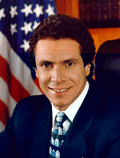 |
Home | Contact Us | A to Z |
 |
Andrew M. Cuomo
Highlights of HUD Accomplishments 1997-2000 (spanish version) Biographical Information (spanish version) Andrew Cuomo was sworn in as the 11th U.S. Secretary of Housing and Urban Development after being unanimously confirmed by the Senate in January 1997. President Clinton called Cuomo "the best person in this country who is today suited to lead HUD into the 21st century." Cuomo began reinventing HUD with a historic Management Reform Plan in 1997. The plan cracks down on waste, fraud and abuse, and addresses decades-old management problems at the Department. Key reforms that have been implemented include: creation of an Enforcement Center headed by an FBI agent; the first comprehensive inspection of all housing subsidized or insured by HUD; creation of more efficient "back office" processing centers, along with storefront offices to serve the public; major improvements in HUD's financial systems; and creation of Community Builder employees. The Secretary has won Congressional approval of the best HUD Budgets in 10 years - $25.5 billion in Fiscal 1999 and $26 billion for Fiscal 2000. Budgets enacted during his term contained initiatives to increase the supply of affordable housing and homeownership, and to create jobs and economic development. These include: the first new rental assistance subsidies approved by Congress in five years; reforms to integrate public housing; higher limits on mortgages insured by the Federal Housing Administration; a crackdown on housing discrimination; expanded programs to help homeless people get housing and jobs to become self-sufficient; and creation of new Empowerment Zones. In 2000, Cuomo led HUD efforts to negotiate a historic agreement with America's largest handgun manufacturer. The agreement requires Smith & Wesson to change the design, distribution and marketing of guns to make them safer and to help keep them out of the hands of children and criminals. In 1993 Cuomo came to HUD as an Assistant Secretary and was responsible for community and economic development, job creation, affordable housing and homeless programs. He developed the Continuum of Care strategy to help homeless people become self-supporting. He also created a consolidated planning process that gave communities and residents a greater role in determining how HUD funds should be used. The Continuum of Care strategy and the consolidated plan have won Harvard University's Kennedy School of Government Innovations in American Government Award. Cuomo is the first HUD Secretary to have built and operated housing developments. He founded Housing Enterprise for the Less Privileged (H.E.L.P.) in 1986, which grew to become the nation's largest private provider of transitional housing for the homeless. It provided education, job training, treatment for drug and alcohol abuse, mental health services, and emergency and transitional housing to help homeless people turn their lives around and become self-supporting. In 1988, Cuomo gave up his law practice to go to work full-time running H.E.L.P in New York City. In 1991, he became head of the New York City Commission on the Homeless, while continuing to run H.E.L.P. The Commission achieved wide acclaim for its recommendations. After receiving a bachelor's degree from Fordham University in 1979 and a law degree from Albany Law School in 1982, Cuomo became campaign manager for his father, Mario M. Cuomo, in the elder Cuomo's 1982 race for Governor of New York. Andrew Cuomo spent a year - and accepted an annual salary of just $1 - as a key aide to Governor Cuomo. He then practiced law - as an Assistant District Attorney in Manhattan in 1984-85, and as a partner in a New York City law firm in 1985-88. Cuomo was born in Queens in New York City on December 6, 1957. He and his wife, Kerry Kennedy Cuomo, have three daughters - Mariah, Cara and Michaela.
|
||
| Last updated: December 5, 2000 Content Archived: January 20, 2009 |
||


